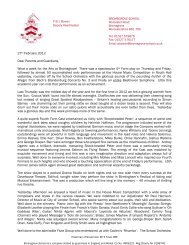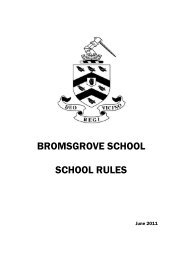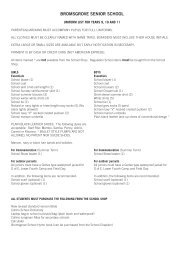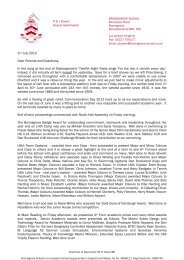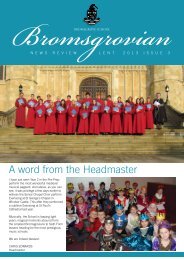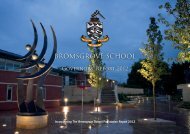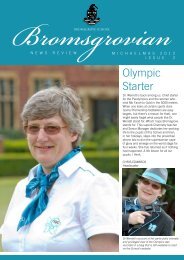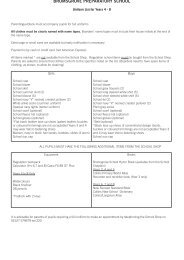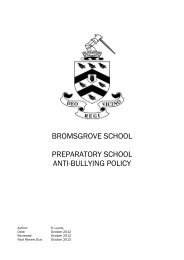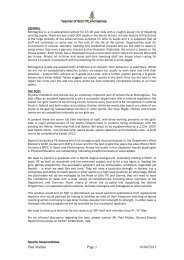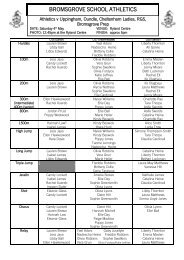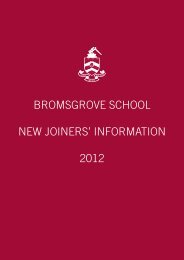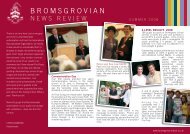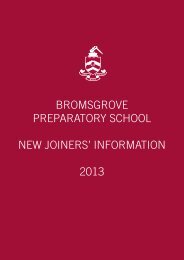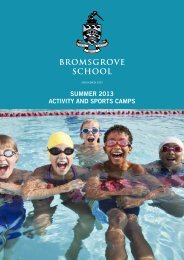Sixth Form Course Booklet 2013 - Bromsgrove School
Sixth Form Course Booklet 2013 - Bromsgrove School
Sixth Form Course Booklet 2013 - Bromsgrove School
Create successful ePaper yourself
Turn your PDF publications into a flip-book with our unique Google optimized e-Paper software.
FURTHER MATHEMATICS<br />
WHY STUDY FURTHER MATHEMATICS?<br />
Mathematics is a hugely broad subject that includes branches that are utterly different other than that they make use<br />
of symbolisation and that they involve logical and analytical processes. Single mathematics A level of necessity<br />
concentrates mostly on those topics within the subject that are needed in its role as a service provider for other<br />
subjects or further study. Further mathematics enables some appreciation of the breadth of the subject to be<br />
developed. It enables abstract ideas to be studied in rather more depth. It enables applied ideas to be studied in depth<br />
that will give study of mathematically based higher education courses a flying start. Since able mathematicians can<br />
work more quickly through ideas and their mathematics is more advanced at the start of the course, they will not find<br />
the single subject particularly challenging; this course gives then something to get their teeth into.<br />
AIMS OF THE COURSE<br />
1. To develop interest in and enjoyment of the subject.<br />
2. To develop an appreciation of the breadth and depth of mathematics.<br />
3. To develop an ability to think abstractly and logically in depth.<br />
4. To encourage a sense of achievement in meeting an intellectual challenge.<br />
5. To develop an advanced base for further study.<br />
6. To develop affection for the subject.<br />
SKILLS NEEDED FOR AND DEVELOPED IN THE COURSE<br />
These are essentially the same as those needed for single mathematics, but developed to a higher degree. Pupils<br />
studying further mathematics need to take full responsibility for their own learning and to take initiative when (if) they<br />
hit difficulty.<br />
REQUIREMENTS FOR STARTING THE COURSE<br />
The course is Mathematics A level in the Lower <strong>Sixth</strong> and Further Mathematics A level in the Upper <strong>Sixth</strong>. The<br />
requirement to start the course is IGCSE Mathematics grade A*, but preferably some mathematical study beyond<br />
GCSE, such as the units C1 and C2 (as covered by Set 1 in the Fifth <strong>Form</strong>). Normally Further Mathematics A level is<br />
only studied if a grade A has been achieved in the Lower <strong>Sixth</strong> or if an A can be guaranteed through retakes in the<br />
Upper <strong>Sixth</strong>. If this is not the case, it is usual to aim for AS Further Mathematics instead, which allows time to<br />
concentrate on achieving the A in Mathematics.<br />
<strong>Course</strong> followed: Mathematics<br />
Examination Board: Edexcel<br />
CONTENT OF THE COURSE UNITS<br />
A minimum of six further units are studied in addition to those covered in the Lower <strong>Sixth</strong> Mathematics A level course.<br />
These are a selection from Further Pure Mathematics 1, 2 and 3 Mechanics 3 and 4, Statistics 2 and 3 and Decision<br />
Mathematics 1. These ensure that pupils study mathematics to the necessary breadth and depth both to be<br />
thoroughly prepared for the study of the subject at university and to have a clear idea of the huge range of its<br />
application.<br />
74



